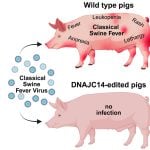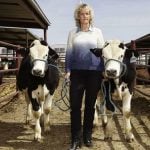Phil Moddle and his family own and operate Arrowwood Farm & Events in Middlesex County, Ontario and participate in the ALUS Middlesex program. The farm hosts blueberry picking, sharecropping, events and environmental stewardship projects.
“We were looking for a place in the country and came across this property with an existing blueberry orchard on it,” says Phil of how his family came to make their home at Arrowwood in 2015. “It’s a very beautiful spot. The original blueberries were planted about 1980 by the previous landowners and in 1999 they made significant changes to include landscaping with an abundance of Carolinian tree plantings. They also built a venue where they could do weddings and host other events. So, it was a good fit for us.”
Phil’s recent tree planting project, undertaken in 2021 with ALUS Middlesex, is part of a broader effort funded by the Government of Canada’s 2 Billion Trees program. Its aim is to put more trees on the landscape, to address climate change and to cultivate the multitude of benefits trees provide to the natural world and to human communities.
“The tree planting is adjacent to a stream feature on our land,” Phil says. “Our soil here is not all that dissimilar to other areas, but depending on where you are, you have anywhere from 10 to 20 feet of fine, fluvial sand overlying a clay till. So, we have a fair bit of erosion of that sand along Big Munday Creek, which runs through our property. And it has a number of small, seasonal tributaries that feed into it. They are slowly advancing back into the farm fields as the sand erodes.”
The trees prevent excess sediment and run-off from the landscape entering the creek, improving water quality for wild plants, animals and other species that live in the ecosystem as well as benefiting downstream communities. Trees provide a variety of ecosystem goods and services such as water filtration, erosion control, wildlife habitat and carbon sequestration.
Phil and his family weren’t farmers before they moved to Arrowwood, though his wife, Kathy, did grow up on a farm. An environmental consultant, Phil followed his passion for nature and stewardship to live on the land with his family and share its bounty and wonder with a broader community.
“When people come in for weddings or to pick blueberries, they can enjoy walks or explore parts of the property as well,” Phil says.
Exploration and engagement with the land is an important takeaway for visitors to Arrowwood. “The tallgrass prairie plantation is unique,” Phil says. “It’s closer to our venue where there’s agritourism. So, as habitat for threatened species and providing space for biodiversity, it also is a potential conversation point.”
People visiting the farm to pick blueberries or to host their wedding can also learn and observe how agriculture and nature are intertwined.
The Moddle family’s approach fosters this sort of visitor interaction and public education. It also underpins the community-focused work of ALUS Middlesex.
Phil got an early start with ALUS Middlesex, joining the community’s Partnership Advisory Committee when the program launched in 2017. He continues to be an advocate and participant.
“I think it’s a good program in that it encourages working farms to get involved with environmental projects,” he says. “Things like improving water quality and increasing biodiversity are consistent with my values.”
A key part of ALUS is supporting up-front costs of projects on rural land and providing ongoing management and maintenance payments to ensure the best outcome for the environment and participating farmers and ranchers. The ALUS projects at Arrowwood allow Phil and his family to showcase the ways certain land management practices can benefit the environment and support working farms.
“ALUS respects the needs of the landowner to be profitable, to have an operation still succeed economically, but where they can also do their part in being good stewards of the land for future generations,” Phil says.







